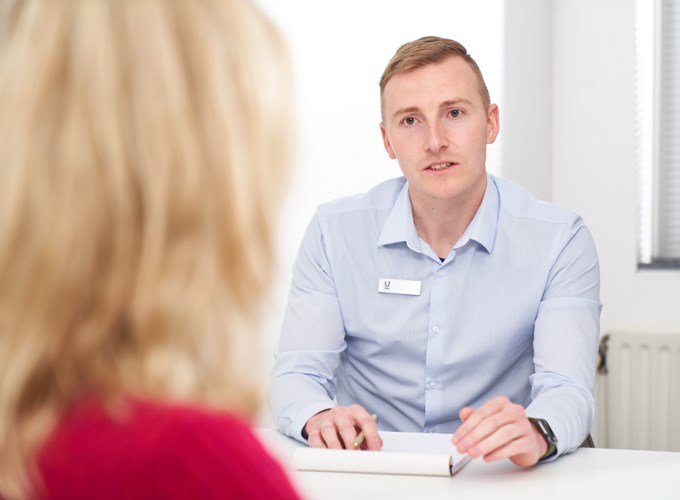Medication
Prescription drug addiction treatment
Prescription drugs initially have a beneficial effect and can be prescribed to relieve pain or to help someone relax during a stressful period. Short term use will not do any harm but there is a risk that you could become dependent on the medicine. This is when U-center could help and treat your prescription drug abuse.
Communication center
Speak with a professional
How can we help you?
Please feel free to contact us. We are happy to help you!
or call us on 0031-343556400


How can you recognize an addiction to prescription drugs?
How do you know if you are addicted? When you keep needing to take more in order to experience the same effect, or when you stop you experience withdrawal symptoms. Sometimes just the thought of stopping can be unbearable. People with an addiction to prescription drugs often appear drowsy or dazed. If you are abusing prescription medication, you might have trouble concentrating. Life seems to pass you by and you give an impression of being absent.
Prescription drug addiction
Prescription drug addiction symptoms
If you try to stop taking the medication, you could experience acute withdrawal symptoms.These include:
Symptoms
- Depression
- Nervousness
- Heightened irritability
- Anxiousness
- Restlessness
- Insomnia
- Depression
- Nervousness
- Heightened irritability
- Anxiousness
- Restlessness
- Insomnia
Long-term effects
Long-term use of prescription medication can have far-reaching consequences. You could experience mood swings, problems with memory or poor coordination, and you may become increasingly tired and hungry. Abusing prescription medication can also have a negative impact on your social life. It can reduce your sexual appetite, and put increasing pressure on relationships at home and at work. Some people even become aggressive or develop suicidal tendencies.
Different types of prescription drugs
It is estimated that more than 18 million people with the age of 12 year or older suffer from prescription drug abuse in the United States.The most common addictions are to painkillers, tranquilizers or sedatives, and sleeping pills. A distinction is often made between addiction to inhalers, opioids (strong painkillers), hypnotic or soporific drugs (sleeping pills) or anxiolytics (sedatives or benzodiazepines). An addiction to painkillers and benzodiazepines are explained in detail here.
What are painkillers and how do they work?
Painkillers (analgesics and opioids) are medicines that reduce or take away pain. They do this by blocking the electrical circuits in the nervous system (the pain) and stimulate parts of the brain that produce a feeling of well-being (or “high”). The most effective painkillers are opioids like morphine, codeine, pethidine and methadone.
What are the effects of taking painkillers long term?
Painkillers can be dangerous because they give an initial feeling of euphoria. Taking painkillers over the long term leads to physical dependence. Not only that, but you need an increasing amount to have the same pain relief. If you try to stop you will experience withdrawal symptoms.
What are the symptoms of an addiction to painkillers?
- Constipation
- Dizziness
- Indifference
- Nausea / vomiting
What are benzodiazepines?
Sleeping pills and tranquilizers belong to a group of medicines called benzodiazepines, like diazepam, temazepam and oxazepam. Common brand names include Valium and Xanax. These are real tranquilizers, or prescription drugs that have a calming or numbing effect.
What are the effects of benzodiazepines?
They have a soothing effect, relax your muscles and help you to sleep. The accompanying reduction in tension can be really helpful if you have a stressful job, trouble sleeping, or if there are tensions at home. What is problematic with this sort of medication is that they suppress underlying emotions, which do not go away. This way, causes of the problems remain unaddressed.
Who are benzodiazepines prescribed for?
Benzodiazepines are regularly prescribed to people with anxiety or insomnia, as well as people with depression or burnout. They can help treat certain types of epilepsy and counteract alcohol withdrawal symptoms.
What are the withdrawal symptoms for benzodiazepines?
If you are addicted to a benzodiazepine, you are dependent on it and you can no longer stop taking it. If you try, you may experience the following withdrawal symptoms:
- Sleeping problems
- Irritability
- Restlessness
- Acute depression
- Seizure

Our treatment for prescription drug abuse
At U-center you receive completely personalized treatment for prescription drug abuse. We start by reducing the medication and go on to look into the factors leading to the addiction. Together, we work towards changing the patterns of behavior that are maintaining the problem. Any underlying issues, your physical condition and your social life all play an important role in the treatment. We will strengthen your mental resistance and help you to stop taking the medication.
Read more about our treatmentsIntegrated personalized approach
An addiction to prescription medication is often the result of other problems such as anxiety or a traumatic experience. There could be many reasons leading to your addiction. Continuing to take the medicine sustains your complaints. Getting out of this vicious circle requires tailor-made treatment. That is why at U-center we take an integrated, individualized approach. Together, we look at everything that has had an influence on your life, from your personality, relationships, family and work, to your physical health. Together with our treatment team, we research the underlying issues behind the addiction. We help you to change by gaining new insights into the behavioral patterns that are maintaining your addiction.


Prescription drug treatment center
U-center offers a seven-week intensive and integrated inpatient treatment programme. Inpatient treatment at our treatment center near Maastricht gives you the opportunity to work on yourself and your problems with our help and support. Together with your mentor, you will draw up a personal treatment plan which provides you with the necessary guidelines and sets out the goals you wish to achieve. Our professional staff will provide you with all the tools and support. However, your commitment is also of the essence in order to make progress. Our healing environment, consisting of warm and welcoming surroundings and various facilities, ensures that you have every opportunity to work on yourself and provide the space you need.
FAQ
Frequently asked questions about medicine addiction and our treatment
Before you start an application, you naturally want to know more about U-center's approach, our treatment method and other practical information. Has your question not yet been answered? Please contact our communication center.
At U-center we treat many psychological disorders. In particular, we specialize in the treatment of co-occurring disorders (comorbidity). However, our programme is not always suited to everyone’s needs. Read more about our criteria for treatment on our terms & conditions page.
From experience we know that it takes a huge effort to talk to someone about their drug addiction. We advise you not to try to tackle the problem alone, but to seek support from friends and family or professionals. Feel free to contact us for help.
At U-center you can quickly go for a treatment. Within 1 day we can process your registration and take the first telephone intake. Your spot is usually available within 4 weeks.
In most cases this is the case. However, the exact coverage varies depending on which country you are living in and the terms of your health insurance. For more information please consult our cost and insurance page.
Our international treatment center is equipped with all the necessary facilities and also provides some extras. For more information please consult our clinic facilities page.

Our approach
A new perspective in 7 weeks

Admission procedure
We are here for you
